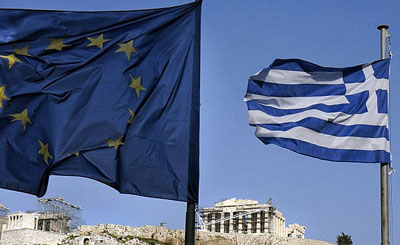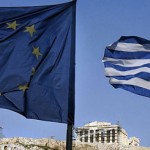Goldman: “Greece Will Remain In Euro Even If It Votes No”, And How Markets Will React

The time to negotiate the Greek referendum this Sunday has come and gone and at this point, one can only sit and wait as the vote results start trickling in on Sunday evening. And, as Goldman’s Huw Pill prudently observes, the outcome of Sunday’s Greek referendum is uncertain. “Regardless of the outcome, Greece will continue to face substantial economic dislocation in the shorter term.” What is interesting is that Goldman says “Greece will ultimately remain in the Euro area even in the event of a ‘No’ vote.”
Clearly, this together with the earlier IMF note, is great news for the Greek government, which can now point to not only the IMF backing its original claim that a debt haircut is absolutely necessary, but that none other than Mario Draghi’s former boss, Goldman Sachs, agrees with Varoufakis that Greece will remain in the Eurozone even after a “No” vote.
That said, this is how Goldman handicaps the possible voting outcomes and the subsequent reactions:
Result of referendum likely to prove less pivotal than how Greek domestic politics evolves in response to it. We envisage three main scenarios following the referendum:1. A ‘Yes’ vote, followed closely by the resignation of Messrs. Tsipras and Varoufakis and the formation of a new Greek government. This is likely to be the most market-friendly outcome. Clearly, its implications will hinge crucially on the character of the new government. A government committed to reform, credible in the eyes of the creditor institutions and with a mandate to act (e.g., a technocratic government enjoying a broad base of parliamentary support and committed to a limited tenure followed by elections) could move forward to a new programme that would allow a resumption of Greece’s financial and liquidity support. Weaker governments that fall short on these dimensions would likely struggle to move forward with the same vigour and pace.
2. A ‘Yes’ vote, with the current government seeking to remain in power. Such an outcome appears inherently unstable. Creditors are unlikely to resume funding Greece under a Tsipras government, given the breakdown of trust resulting from the recent painful negotiations. The Greek economy would thus remain mired in its current state of ‘suspended animation’ with banks closed. Eventually the political contradictions and economic fragilities that would follow are likely to create powerful forces for political change in Greece. In our view, these forces are more likely to lead towards a rapprochement with creditors, but a more negative dynamic towards ‘Grexit’ cannot be ruled out.
3. A ‘No’ vote, in which the current government becomes more politically entrenched. This is likely to be viewed negatively by markets. We do not see such an outcome as necessarily implying a definitive ‘Grexit’. In the first instance, such an outcome is likely to perpetuate the status quo: the European authorities would neither extend further financial and liquidity support nor engage in a new round of negotiation with the Greek government offering more favourable terms. As a result, Greek banks would remain closed and the economic situation would deteriorate, ultimately triggering political change as the economy seizes up. Of course, that change could move in a chaotic direction leading to a ‘Grexit’. Uncertainty is clearly higher in this scenario. But our base case would remain that any attempt to shift policies in the direction of exit would prompt a domestic political response bringing down the government and moving to an accord with Brussels to maintain membership of the Euro area.
But while Goldman’s assessment that a “No” vote allows for Greece to remain in the Euro and is thus beneficial to the current administration which has claimed just that all along, Goldman’s own take is less favorable for the future of the Tsipras government:
Across the spectrum of scenarios sketched out above, our base case is that: (a) eventually there will be political change in Greece; and (b) this political change will ultimately lead in the direction of Greece reaching a new accommodation with its creditors that preserves Euro membership.
So having already effectively decided the fate of the Tsipras government, how do the three Goldman scenarios differ:
(a) the pace at which the political change takes place (which declines as we move from scenario #1 through to scenario #3); and (b) the uncertainty surrounding our base case (with the risks of an alternative chaotic ‘Grexit’ outcome rising as we move from scenario #1 through to scenario #3).
As for the market response, Goldman begins with the bond markets. Fear not says Goldman, for they are all in the hands of the ECB:
With regard to the wider implications of developments in Greece for Euro markets, we maintain our view that the European authorities in general and the ECB in particular stand ready to act as necessary to preserve the integrity of the Euro area in the face of any turbulence emerging from Greece.
In our view, the ECB can be relied upon to do “whatever it takes” to support other vulnerable Euro area countries. The likely method in the first instance would be an expansion and/or reorientation of sovereign debt purchases within the ECB’s existing programme. While the ECB is still likely to be reactive rather than pre-emptive in stepping up sovereign purchases, we expect that reaction to be both prompter and more aggressive than in the past. The likely trigger would be a (substantial) widening of peripheral sovereign spreads symptomatic of a re-fragmentation of Euro government and credit markets. We do not expect the ECB to be highly sensitive to falls in the equity market or the Euro exchange rate.
Still, even Goldman is willing to admit the ECB may not be omnipotent and suggests that “in the event of negative surprises, bond spreads could widen out as much as 200-250bp, with 10-year BTPs yielding around 3%. From these levels and upwards we would view the probability of an ECB intervention as increasing.
What about a good outcome:
In the event of a ‘Yes’ vote this Sunday, and a subsequent accommodation between the Greek authorities and the official sector creditors, we would look for BTP/Bonos to eventually go back down to around 100-120bp (or 30-50bp tighter from current levels) as investors anticipate a new political direction followed by fiscal and structural adjustments, comprising a re-profiling of the Greek public debt. These steps would, however, take time to achieve, and the price action could remain volatile.”
As for stocks, Goldman’s worst case “No” outcome is a 10% plunge in the Stoxx 50:
Based on the impact of sovereign spreads and equity risk premia, our best estimate for the worst-case downside in the equity market in Europe on a ‘No’ vote is a move to around 3150 on Eurostoxx 50 (around 10%)…
… but don’t panic because once again…
we think this would be short-lived as ECB intervention would kick in, prompting investors to focus on improving fundamentals; we would see any meaningful correction as a buying opportunity, particularly for MIB, IBEX and DAX for investors taking a medium-term view. A ‘Yes’ vote followed by an accommodation between the Greek authorities and the institutions would likely see equities up around 10%, back to April highs of around 3830.
In short: a “No” vote will roil markets, send stocks tumbling and yields soaring before a “forceful” ECB response (one which the ECB itself hinted at today when it expanded the universe of monetizable collateral) restores (ab)normalcy even as Greece remains in the Eurozone but really, in limbo.
The conclusion: for Tsipras to have had the full leverage he wanted, he should have had this standoff last year, before the ECB launched its QE.
Then again, the much hyped ECB response just may backfire. After all, QE in Sweden has already failed forcing the central bank to do even more QE until the whole thing blows up due to lack of liquidity. And when it comes to lack of eligible collateral, the ECB is just a few feet behind Sweden. It would be delightfully ironic if, in an attempt to save Europe by boosting its QE, the ECB destroys everything and it is Greece who ends up with the last laugh.
* * *
If all of this seems complicated, here is the traditionally far simpler take from Bank of America:
Nai. A “yes” vote is the outcome currently more priced-in to financial markets, and would cause a bid to European assets, at least in the short-term. The reaction of the Euro would be most important to watch: a rally (as EU growth expectations rise) would mean a more durable rally in European assets and a reversal of the long DAX, short banks trade that has worked so well in Europe the past 2 years. Note also that Cyprus shows that even under capital controls some Greek assets could also find a strong bid.
Oxi: A “no” vote by contrast would signal GREXIT; a Greek economy without banks, without a lender of last resort, without access to liquidity, in deep recession and exposed to new social and geopolitical risks. In this scenario we would watch the European banks closely. Failure of FT3FIN index to hold 850-900 would be very negative for global risk assets in July.
Source: zerohedge – Goldman: “Greece Will Remain In Euro Even If It Votes No”, And How Markets Will React



























